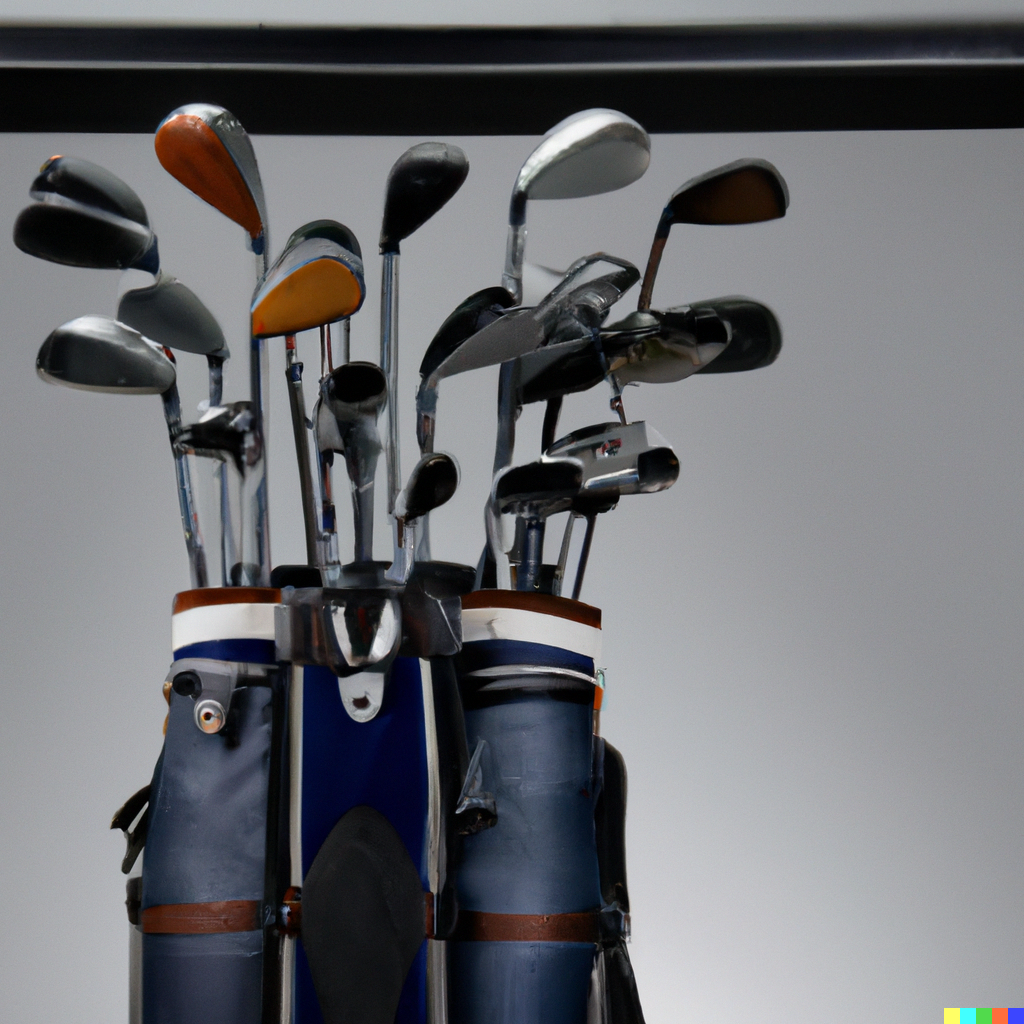- Home
- Golf Clubs
- Which Golf Clubs Are Best for Beginners
The Ultimate Guide to Choosing the Best Golf Clubs for Beginners
Starting your golf journey can be both exciting and overwhelming, especially when it comes to choosing the right equipment. Which golf clubs are best for beginners? This guide provides insights tailored to your interests and pain points, ensuring you make an informed decision. Whether you're in a hurry or have time to delve deep, our key takeaways and FAQ section at the bottom have got you covered. Dive in and let's tee off on the right foot!
Golf, a game of precision, patience, and strategy, has always been a sport that many aspire to master.
But where does one start?
The answer lies in the tools of the trade: golf clubs. When I first started my golfing journey, I was overwhelmed by the sheer number of options available. From drivers to putters, each club promised to be the "best" for beginners. But how could I decipher the marketing mumbo-jumbo and find the real gems?
As a beginner, I was privy to insider information and found myself dragged kicking and screaming through countless reviews, trying to figure out which clubs would give me that cutting edge. I was looking for something wickedly effective, a set of clubs that would instantly transform my game. But with so many brands and models out there, making a choice felt like an impossible task.
After years of trial and error, tapping into untapped resources, and seeking advice from golfing experts, I've managed to crack the code. I discovered the secret source to finding the perfect golf clubs for beginners. And now, I'm here to share that insider information with you, ensuring you don't make the same mistakes I did.
Are you ready to dive into the world of golf with the right set of clubs? If so, read on!
 A beginner golfer analyzing the best club for his game.
A beginner golfer analyzing the best club for his game.What Are the Best Golf Clubs for Beginners?
When I first started golfing, I was completely overwhelmed by the variety of golf clubs available. I had no idea which ones were the best for beginners like me. I wanted something that would help me improve my game and not break the bank. After doing extensive research and trying out different clubs, I've learned a lot about what makes a good golf club for beginners.
Here are some key factors to consider when choosing golf clubs as a beginner:
1. Clubhead Size:
- Larger clubheads are generally more forgiving and can help you hit the ball more consistently.
- Look for clubs with a larger sweet spot, which will help you get more distance even if you don't hit the ball perfectly.
2. Shaft Flex:
- The shaft flex should match your swing speed. If you have a slower swing speed, a more flexible shaft can help you get more distance.
- Beginners often benefit from a regular or senior flex shaft.
3. Club Length:
- Make sure the clubs are the right length for your height. Clubs that are too long or too short can make it difficult to hit the ball consistently.
4. Set Composition:
- A good beginner set should include a driver, a few fairway woods, a set of irons, and a putter.
- Some sets also include a hybrid club, which can be easier to hit than a long iron.
5. Price:
- You don't need to spend a fortune on your first set of golf clubs. There are many affordable options that are great for beginners.
- Consider buying a used set or looking for sales to save money.
Here are some good golf clubs for beginners if you don’t opt for custom fitting:
Callaway Strata:
- This is a popular option for beginners because it includes everything you need to get started.
- The clubs are designed to be forgiving and help you get more distance.
Wilson Profile SGI:
- This set is also great for beginners and includes a variety of clubs to help you improve your game.
- The clubs are lightweight and easy to swing.
Cobra Fly XL:
- This set includes a driver, fairway woods, irons, and a putter.
- The clubs are designed to be forgiving and help you hit the ball straighter.
In conclusion, the best golf clubs for beginners are those that are forgiving, the right length for your height, and within your budget. Take the time to try out different clubs and find the ones that feel comfortable for you. And remember, practice makes perfect! So get out there and start swinging. Are you ready to hit the golf course with confidence?
 A variety of golf clubs tailored for beginners.
A variety of golf clubs tailored for beginners.How Do I Choose the Right Golf Club as a Beginner?
Choosing the right golf club as a beginner can feel like a daunting task. I remember when I first started golfing, I was overwhelmed by the sheer number of options available. Every club looked the same to me, and I had no idea what to look for. But over time, with a bit of research and some trial and error, I learned how to pick the perfect club for my needs.
Here's what I discovered:
1. Understand Your Swing Speed:
Your swing speed determines the type of shaft you should choose. Beginners usually have a slower swing speed, so a flexible shaft might be more appropriate. It helps in maximizing distance.
2. Club Length Matters:
The length of the club should be in proportion to your height. Using a club that's too long or too short can hinder your swing and accuracy.
3. Clubhead Design:
For beginners, a club with a larger clubhead and a bigger sweet spot is ideal. It offers more forgiveness on off-center hits.
4. Set Composition:
As a beginner, you don't need every club available. Start with a basic set that includes a driver, a couple of irons, a putter, and maybe a hybrid or two.
5. Budget:
While it's tempting to buy the most expensive clubs, it's not necessary. There are many budget-friendly options that are perfect for beginners.
6. Seek Expert Advice:
When I was starting, I visited a local golf store and spoke to an expert. They analyzed my swing and recommended clubs that suited my style and budget.
7. Test Before Buying:
Just like I did, always test a club before purchasing. It gives you a feel of the club, and you can determine if it's comfortable for you.
One of the biggest mistakes I made as a beginner was buying a club solely based on brand reputation. I thought that if it's a well-known brand, it must be the best. But I quickly realized that the club didn't suit my swing style. It was a costly lesson, but it taught me the importance of testing and choosing a club based on personal comfort rather than brand name.
In conclusion, choosing the right golf club as a beginner is all about understanding your needs, doing some research, and testing various options. And remember, the most expensive club isn't necessarily the best for you. It's all about what feels right in your hands and suits your playing style. So, are you ready to find the perfect golf club for you?
What Are the Differences Between Beginner and Advanced Golf Clubs?
Navigating the world of golf clubs can be a bit like trying to decipher a foreign language. Especially when you're trying to understand the differences between clubs designed for beginners and those for advanced players. I've been there, trust me. When I first started golfing, I was handed a set of advanced clubs, thinking they'd make me play like a pro. Spoiler alert: they didn't. Instead, I struggled more.
Here's what I've learned about the key differences between beginner and advanced golf clubs:
1. Clubhead Design:
- Beginner: Typically have a larger clubhead with a bigger sweet spot. This design is more forgiving, making it easier for new players to hit the ball.
- Advanced: Clubheads are often smaller with a reduced sweet spot, requiring more precision which skilled players possess.
2. Shaft Flexibility:
- Beginner: Flexible shafts are common as they cater to slower swing speeds, helping to maximize distance.
- Advanced: Stiffer shafts are preferred as they cater to faster swing speeds, offering more control.
3. Club Length:
- Beginner: Clubs might be slightly shorter to promote better control and accuracy.
- Advanced: Standard or longer lengths are common, as experienced players can handle them without sacrificing control.
4. Loft Angle:
- Beginner: Higher loft angles help lift the ball off the ground, making it easier for newbies to achieve height on their shots.
- Advanced: Lower loft angles give skilled players more control over ball trajectory.
5. Set Composition:
- Beginner: A basic set might exclude certain clubs, focusing on essentials like a driver, few irons, and a putter.
- Advanced: A comprehensive set including specialized clubs like blade irons and low-lofted driver.
6. Material and Technology:
- Beginner: Clubs often use basic materials and technology, focusing on durability and forgiveness.
- Advanced: High-end materials and cutting-edge technology are used to enhance performance attributes like spin control and ball speed.
I remember the day I confidently walked onto the course with those advanced clubs, thinking they were my ticket to golfing greatness. Instead, I found myself struggling with every shot, unable to control the ball's direction. It was a humbling experience, but it taught me a valuable lesson: the right equipment matters. It wasn't until I switched to beginner-friendly clubs that I truly started to enjoy the game and improve my skills.
In conclusion, while advanced golf clubs offer precision and control for seasoned players, beginner clubs are designed to be more forgiving and user-friendly. It's essential to choose clubs that match your skill level. After all, the right equipment can make a world of difference in your game. So, are you equipped with the right set of clubs for your golfing journey?
 Tips and tricks for selecting the right golf club.
Tips and tricks for selecting the right golf club.Key Takeaway: Choosing the Right Golf Clubs for Beginners
Selecting the right golf clubs as a beginner is not just about buying the most expensive set or the brand that your favorite pro uses. It's about understanding your needs, skill level, and choosing clubs that will enhance your learning experience. Here's a quick recap:
Clubhead Design: Opt for clubs with a larger clubhead and a bigger sweet spot for more forgiveness.
Shaft Flexibility: Flexible shafts cater to slower swing speeds, maximizing distance for beginners.
Club Length: Slightly shorter clubs can promote better control and accuracy for new players.
Loft Angle: Higher loft angles can help lift the ball, aiding beginners in achieving shot height.
Set Composition: Focus on essential clubs like a driver, a few irons, and a putter when starting.
Material and Technology: Durability and forgiveness should be the priority over high-end materials.
Take Action!
Your golf journey is unique, and the right set of clubs can make all the difference. Dive deep into the world of golf with the right equipment by your side. And remember, the Golfeaser community is here to support you every step of the way.
Engage with the Golfeaser Community: Share your golfing stories, challenges, and triumphs. Learn from others and offer your insights.
Stay Updated: Sign up for our newsletter to receive the latest tips, tricks, and updates from the world of golf.
Live the Golfeaser Manifesto: Golf is not just a sport; it's a way of life. Embrace the values, ethics, and spirit of the game.
Your journey in golf is just beginning, and with the right clubs and the Golfeaser community by your side, the sky's the limit. So, gear up, step onto the green, and let's make some unforgettable golfing memories together!
FAQ: Which Golf Clubs Are Best for Beginners?
What clubs should a beginner use in golf?
What clubs should a beginner use in golf?
If you're new to golf, it's essential to start with a core set of clubs to develop your skills. As a beginner, you don't need the full fourteen clubs. Focus on refining your skills, stance, and swing with a select few. Once you've mastered the basics, you can expand your collection.
What's the difference between clubs for professionals and amateurs?
What's the difference between clubs for professionals and amateurs?
Beginners and professionals have different needs when it comes to golf clubs. As a novice, your handicap will likely be high, so you'll benefit from more forgiving clubs that help you build foundational skills. Over time, as you improve, you can transition to clubs suited for advanced players.
Which clubs are essential for beginners?
Which clubs are essential for beginners?
Beginners should consider starting with the following clubs:
Driver: Used mainly for tee shots.
Irons (specifically 6-iron, 7-iron, and 8-iron): Useful for practicing full swings and improving technique.
Putter: Essential for putting the ball into the hole.
Wedges (Pitching and Sand): Helpful for chipping around the green and making pars.
Woods or Hybrids: Versatile clubs suitable for various shots.
What's the ideal club set-up for beginners?
What's the ideal club set-up for beginners?
A beginner doesn't need a full set of fourteen clubs. A basic set can include a driver, pitching wedge, sand wedge, fairway wood or hybrid, putter, and the 7-iron, 8-iron, and 9-iron. This totals to just eight clubs, which is sufficient for someone starting.
How do I decide when to use each club?
How do I decide when to use each club?
The choice of club depends on the distance and type of shot you're aiming for. Spend time on the driving range practicing with each club to understand its range and performance. For long-range shots, consider drivers or hybrids. For mid-range shots, irons like the 7-iron or 9-iron are ideal. For close-range shots, rely on your 9-iron, sand wedge, and putter.
How do I know what golf club to use for beginners?
How do I know what golf club to use for beginners?
For beginners, it's crucial to select clubs strategically. Start with a driver, putter, sand wedge, and a few irons like the 6-iron, 8-iron, and pitching wedge. Additionally, consider a fairway wood or hybrid with 18-21 degrees loft to round out your starter set.
Why are golf clubs so expensive?
Why are golf clubs so expensive?
The cost of golf clubs is influenced by various factors, including brand reputation, materials used, technology, design, and manufacturing processes. High-quality materials and advanced technology can drive up the price. However, there are budget-friendly options available that are suitable for beginners.
What does apex mean in golf?
What does apex mean in golf?
In golf, "apex" refers to the highest point of the ball's trajectory after being hit. It's the peak height the ball reaches before it starts descending. Understanding the apex can help golfers make adjustments to their swing and club selection for optimal performance.
How far should a 56-degree wedge go?
How far should a 56-degree wedge go?
The distance a 56-degree wedge covers depends on various factors, including the golfer's skill level, swing speed, and ball type. On average, a 56-degree wedge can cover distances between 80 to 110 yards for most amateur golfers. However, it's essential to practice and determine your personal average with the club.
























